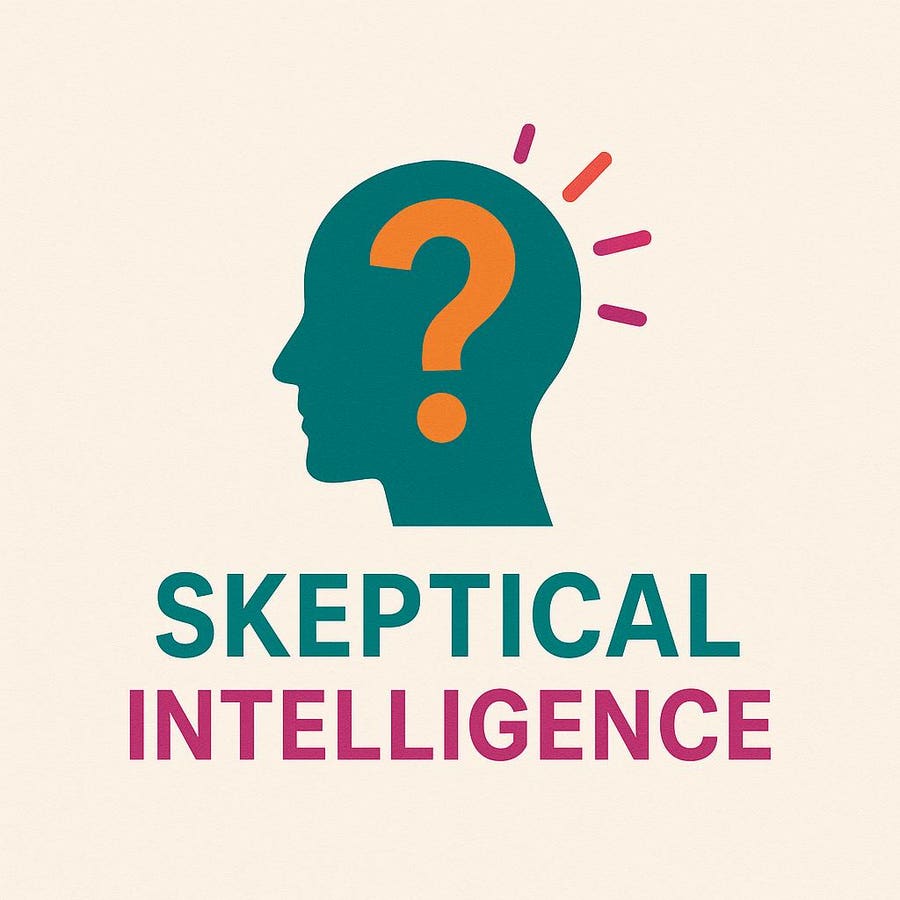Skeptical Intelligence
In boardrooms, strategy offsites, and investor summits, the conversation invariably turns to artificial intelligence. Will it take our jobs, supercharge our growth, or expose hidden risks we’ve never anticipated? Amid the hype, one truth emerges: in a world awash with machine-generated insights, the uniquely human ability to question, probe, and test assumptions—what we might call Skeptical Intelligence—could be our most indispensable asset.
Yet despite billions spent annually on leadership development, few executives can precisely define what it means to think skeptically, let alone how to develop it. To understand why Skeptical Intelligence deserves a seat alongside IQ and Emotional Intelligence, we need to revisit how these earlier concepts reshaped our understanding of human capability—and then explore what a third pillar might entail.
The Age of IQ
For much of the 20th century, intelligence meant only one thing: IQ. It was the gold standard, the quantifiable metric by which students were sorted, employees were promoted, and national rankings were compared.
The concept of general intelligence originated with Charles Spearman in 1904, who observed that individuals who performed well on one type of cognitive test tended to do well on others. This statistical correlation suggested a broad, underlying mental capacity. Alfred Binet in France and later Lewis Terman at Stanford created IQ tests that could numerically represent this capacity, leading to the IQ boom of the 20th century.
IQ proved remarkably good at predicting certain kinds of success: academic performance, logical problem-solving, and even long-term earnings. But by the 1980s, cracks began to appear. Why did some top scorers flounder in the real world while others with merely average IQs thrived?
The Rise of Emotional Intelligence
The first serious challenge came from Howard Gardner, whose 1983 book Frames of Mind introduced the theory of multiple intelligences. Gardner argued that musical, spatial, kinesthetic, interpersonal, and intrapersonal intelligences were just as real and valuable as linguistic or logical-mathematical skills. This pluralistic view was controversial but set the stage for even more focused alternatives.
In 1990, two psychologists, Peter Salovey and John Mayer, proposed the concept of Emotional Intelligence. They defined it as the ability to perceive, understand, manage, and use emotions effectively. In their view, emotions were not a distraction from rational thinking but a vital component of it.
But it was Daniel Goleman who truly ignited the global conversation. His 1995 bestseller Emotional Intelligence: Why It Can Matter More Than IQ argued that self-awareness, self-regulation, empathy, and social skills often trump raw cognitive horsepower in leadership and life. Goleman’s work popularized the idea that a high EQ could distinguish great leaders from merely smart ones.
Corporations embraced the concept eagerly. Emotional intelligence trainings became standard fare in leadership programs at GE, IBM, and Goldman Sachs. Consulting firms created entire practices around measuring and developing EQ. And yet even with these advances, the dominant paradigm still focused on how well we feel and connect—not necessarily how well we question.
Enter Skeptical Intelligence
In the last few years, a new concern has emerged. As machine learning systems become capable of astonishing feats—drafting legal briefs, diagnosing diseases, predicting consumer churn—our natural tendency is to trust them. Algorithms, after all, seem less biased, less emotional, more data-driven than we are. But recent high-profile failures—facial recognition systems that couldn’t recognize dark-skinned faces, loan algorithms that penalized women, language models that hallucinate references—have underscored that AI can be deeply flawed.
And these flaws are often subtle, buried inside complex statistical models that even their creators struggle to fully interpret. The result? The need for a new kind of human intelligence: the capacity to critically interrogate the outputs of sophisticated systems. This is where Skeptical Intelligence comes in.
Skeptical Intelligence is not the same as mere contrarianism or reflexive doubt. It is a disciplined approach to questioning that combines curiosity, critical thinking, epistemic humility (knowing what you don’t know), and a toolkit for evaluating evidence. If IQ is about solving well-defined problems and EQ is about navigating social and emotional landscapes, Skeptical Intelligence is about resisting easy answers and probing beneath the surface—especially when powerful technologies tempt us to outsource our judgment.
We can draw on decades of research in critical thinking and cognitive psychology to sketch out its potential components. Scholars like Robert Ennis, Richard Paul, Rita McGrath, Eric Reis, and Linda Elder have long studied what it means to think critically. Their frameworks emphasize abilities such as:
- Clarifying concepts: Can you define what a term or recommendation actually means? Many AI dashboards use ambiguous language (“customer engagement likelihood”), which invites unwarranted interpretations.
- Seeking evidence: Do you naturally ask, “What data supports this claim?” and “How was this data gathered?”
- Identifying assumptions: Are there hidden premises—cultural, statistical, or organizational—that need to be surfaced?
- Considering alternatives: Do you ask, “What are other possible explanations or predictions?”
- Detecting cognitive biases: Are you vigilant about confirmation bias (favoring information that supports preexisting beliefs) or availability bias (overweighting recent or vivid events)?
- Assessing sources: Not all experts or algorithms are equally credible. Skeptical Intelligence involves knowing how to scrutinize both human and machine authority.
In this sense, Skeptical Intelligence can be thought of as a disposition for critical thinking applied rigorously to the modern data and AI landscape.
Why We Need Skeptical Intelligence Now
Paradoxically, the better AI gets, the more tempting it is to disengage our skeptical faculties. Machine learning models often produce outputs accompanied by confidence scores or impressive-looking graphs, which can lull decision-makers into a false sense of certainty. A 2022 study by Harvard Business School found that managers were significantly more likely to accept flawed AI recommendations if they were presented with visually compelling dashboards—even when inconsistencies were apparent.
This is not merely a theoretical risk. Consider the 2020 incident when a widely used recruiting algorithm at a Fortune 500 company was found to downgrade resumes from women because the training data contained historical biases favoring male candidates. Or the series of fintech apps that misclassified minority borrowers as high-risk based on opaque clustering techniques. These failures happened not because executives were malicious or incompetent, but because they lacked sufficient Skeptical Intelligence to interrogate the models.
Warren Buffett famously said, “It’s good to learn from your mistakes. It’s better to learn from other people’s mistakes.” In the AI era, it’s best to preempt mistakes altogether by cultivating a culture of healthy skepticism.
This does not mean ignoring AI insights. Rather, it means creating systems of “trust but verify”. Leaders high in Skeptical Intelligence know how to ask pointed questions of data scientists and to challenge assumptions without falling into endless analysis paralysis.
The Practice of Skeptical Intelligence
Imagine a CFO reviewing an AI-driven forecast that predicts a 12% uptick in demand for a new product line. Instead of simply applauding or rubber-stamping the recommendation, the CFO trained in Skeptical Intelligence would ask:
- What features did the model weigh most heavily?
- How similar were the training data conditions to today’s market?
- What would it take to falsify this prediction?
- How robust are these results to small changes in inputs?
Or picture a marketing VP using a generative AI tool to craft campaign messages. Someone with strong Skeptical Intelligence wouldn’t just check grammar—they’d probe for embedded stereotypes, test multiple prompts for consistency, and cross-check factual assertions.
Skeptical Intelligence also means knowing when to consult outside experts, when to run pilot tests before full-scale rollouts, and when to keep a human in the loop for judgment calls that have ethical or reputational stakes.
Building Skeptical Intelligence in organizations
How can today’s companies cultivate this emerging form of intelligence?
- Training beyond compliance: Most firms offer generic ethics or critical thinking modules, but few embed robust skeptical inquiry into daily workflows. Scenario-based workshops—testing AI outputs under different conditions—can make this practical.
- Hiring for epistemic humility: Look for candidates who can say “I don’t know” comfortably and who show curiosity in interviews by asking questions about the company’s assumptions and models.
- Rewarding constructive dissent: Firms like Bridgewater Associates have long emphasized “thoughtful disagreement.” Encourage employees to question data-driven decisions—especially when groupthink sets in.
- Creating AI audit teams: Just as financial auditing became standard in the 20th century, algorithmic auditing could be a key 21st-century function. Teams dedicated to probing how models were built and whether they generalize can institutionalize Skeptical Intelligence.
Skeptical Intelligence as a Superpower
When historians look back at the early decades of the AI revolution, they may marvel at how readily humans deferred to machines—sometimes with spectacular results, sometimes with catastrophic consequences. The leaders who thrive will be those who balanced innovation with interrogation, speed with scrutiny.
IQ and EQ remain foundational. But Skeptical Intelligence—the disciplined, curious, humility-infused ability to question even the smartest systems—may prove to be the crown jewel of human capability in the algorithmic age.









